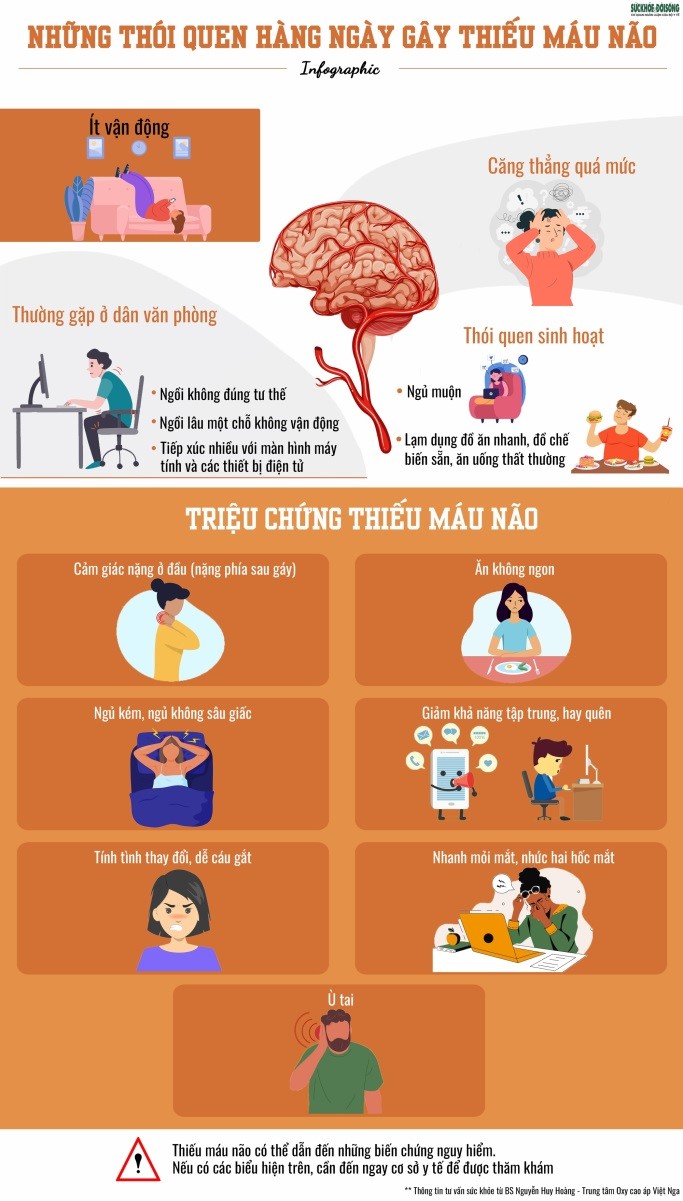COMMON HABITS CAUSES CEREBRAL ISCHEMIA
1/ What is cerebral ischemia?
Cerebral ischemia, also known as cerebral circulatory insufficiency, occurs due to a decrease in blood flow to the brain. This results in a reduction of oxygen and nutrients supplied to the brain, causing brain nerve cells to lack energy for their functions, thereby affecting the brain’s functional activities.(1)
Although the brain is small in size, it consumes up to 20% of the body’s total oxygen. If not supplied with oxygen within 10 seconds, brain tissues will be affected, and if oxygen deprivation lasts for 4 minutes, brain cells will begin to die and cannot be recovered. (2)
2/ Typical Symptoms of Cerebral Ischemia (1)
Individuals experiencing cerebral ischemia may exhibit a variety of characteristic symptoms, including:
- Headaches: This is one of the earliest and most common symptoms (affecting up to 90% of patients) of cerebral ischemia. Headaches associated with this condition are often described as throbbing, diffuse, or localized to the occipital region.
- Dizziness: Patients may experience a sense of unsteadiness when standing or walking, feelings of lightheadedness or vertigo, and frequent darkening of vision when changing positions suddenly.
- Paresthesia: Sensations of numbness or tingling, similar to pins and needles, may occur in the fingers and toes. Some individuals may also experience tinnitus (ringing in the ears).
- Sleep disturbances: Patients may suffer from insomnia, difficulty falling asleep, or interrupted sleep.
- Cognitive impairments: Decreased memory, attention span, and concentration can be symptoms of this condition.
- Emotional disturbances: Cerebral ischemia can make individuals more emotionally reactive, leading to increased irritability compared to those without the condition.
3/ Who is at risk for cerebral ischemia?
Previously, middle-aged and elderly individuals were more likely to develop cerebral ischemia. However, in recent times, this condition has been observed in younger populations, including office workers and mental workers (3) Additionally, individuals with sedentary lifestyles and poor diets are also at higher risk. (1, 4)
According to statistics in Vietnam, the prevalence of diagnosed cerebral ischemia is as high as 80%. This is a significant health concern as it not only affects the quality of life of those affected but can also lead to serious complications.(3)
4/ Everyday Habits That Can Lead to Cerebral Ischemia
In addition to underlying medical conditions, unhealthy lifestyle habits can contribute to cerebral ischemia. According to Lieutenant Colonel, Dr. Nguyen Huy Hoang, from the Vietnam-Russia Hyperbaric Oxygen Center (Ministry of Defense), there are several daily habits that can cause cerebral ischemia, including: (5)
- Prolonged sitting and poor posture: Cerebral ischemia is particularly common among office workers due to improper sitting posture, prolonged sedentary behavior, and excessive screen time.
- Lack of physical activity: A sedentary lifestyle increases the risk of cerebral ischemia. Individuals who practice yoga, swimming, or regularly perform neck exercises are less likely to experience neck pain, shoulder pain, or cerebral ischemia.
- Excessive stress: Young people who are generally healthy often overlook their health by overworking, staying up late, etc., leading to stress. These habits can cause blood vessels to constrict, reducing blood flow to the brain.
- Unhealthy diet and lifestyle: The trend of late-night sleep among young people can lead to stress, causing blood vessel constriction and subsequently cerebral ischemia. Excessive consumption of fast food, processed foods, and irregular eating habits can overburden the liver and contribute to atherosclerosis. This is particularly prevalent in men aged 32 and above, who may already have blood vessel constriction.

5/ How to prevent cerebral ischemia ? (1,2,3,4,5)
Although it is a dangerous disease, cerebral ischemia can be completely prevented and treated if a proper healthcare and nutrition regimen is applied. You should recognize daily habits that cause cerebral ischemia and promptly adjust these habits
- Maintain a correct sitting posture and avoid sitting in one place for too long.
- People with cerebral ischemia should avoid sudden changes in temperature, such as taking a cold shower after being in the sun. When sleeping, avoid drafts. In cold weather, lie down for a while after waking up before getting up to avoid sudden chills.
- Combine with physical exercise and breathing exercises to reduce blood vessel narrowing, helping to reduce the risk of cerebral ischemia as well as cardiovascular diseases such as hypertension and atherosclerosis.
- Have a reasonable rest regimen and avoid overworking.
- Do not pillow your head too high when sleeping. Get enough sleep, ensuring 8 hours per day.
- Build a full nutritional diet, eating plenty of green vegetables and fresh fruits to provide omega-3, iron, vitamins, and minerals for the body. Limit foods high in meat, animal fats, and animal organs as they will increase the level of cholesterol in the body – a cause of blood vessel blockage.
- Have regular health check-ups to detect and prevent diseases early, including cerebral ischemia.
- Use products containing herbs such as ginkgo biloba, blueberries… to enhance cerebral blood circulation, promote blood circulation, and effectively reduce the symptoms of cerebral ischemia.
Ginkgo biloba(6):
Ginkgo biloba, also known as the maidenhair tree, with the scientific name Ginkgo biloba L. Ginkgoaceae, is a species of tree that has existed for millions of years
Clinical trials have shown that ginkgo biloba extract with high concentrations of flavonoids and terpenoids has the effect of increasing cerebral blood circulation, improving blood supply to the brain, and acting as an antioxidant. It is used to improve memory, treat dizziness, vertigo, headache, and migraine.
Blueberries(7):
Blueberry (Vaccinium sect. Cyanococcus) is a flowering shrub; its berries, which are slightly blue or purple, are what we commonly refer to as blueberries.
Blueberries are believed to have the highest antioxidant content of any fruit or vegetable. The primary antioxidants in blueberries belong to a class of polyphenol antioxidants called flavonoids, more specifically anthocyanins – which are abundant in blueberries, thus boosting the body’s antioxidant levels. Anthocyanins can cross the blood-brain barrier, neutralizing free radicals and combating related diseases such as Alzheimer’s, dementia, and vascular diseases. In a human study, nine elderly individuals with mild cognitive impairment drank blueberry juice daily. After 12 weeks, they showed positive signs in several brain functions. A six-year study of over 16,000 elderly individuals showed that blueberries and strawberries helped reduce mental aging by up to 2.5 years.
The trend of choosing supplements containing ginkgo biloba, blueberries… along with vitamins, minerals, and omega-3 helps enhance cerebral blood circulation, support the reduction of symptoms of cerebral insufficiency such as dizziness, vertigo, and headache…and brings convenience to patients. You should choose products from reputable pharmaceutical companies for effective use.
References:
- https://tamanhhospital.vn/thieu-nang-tuan-hoan-nao/
- https://www.vinmec.com/vie/bai-viet/cac-nguyen-nhan-gay-thieu-mau-len-nao-vi
- https://medlatec.vn/tin-tuc/thieu-mau-nao-va-nhung-trieu-chung-dien-hinh-cua-benh-s195-n18583
- https://tamanhhospital.vn/thieu-mau-nao/
- https://tytphuong9qgv.medinet.gov.vn/phong-benh-khong-lay/bac-si-canh-bao-nhung-thoi-quen-hang-ngay-gay-thieu-mau-nao-cmobile11629-83001.aspx
- https://suckhoedoisong.vn/bach-qua-vi-thuoc-quy-16939346.htm
- https://vinmec.com/vi/tin-tuc/thong-tin-suc-khoe/dinh-duong/10-loi-ich-suc-khoe-da-duoc-chung-minh-cua-qua-viet-quat/

- 1. Energize and focus your new year with Ginseng and Ginkgo Biloba
- 2. CAN PEOPLE WITH HYPERTENSION USE CORDYCEPS?
- 3. TIPS FOR STAYING HEALTHY IN THE AUTUMN
- 4. THE EXPERT’S SHARING: THE KEY TO START A NEW DAY FULL OF ENERGY
- 5. GINSENG – “SPECIAL” HERBAL MEDICINE FOR FATIGUE PEOPLE
- 6. THE ROLE OF HERBAL IN INCREASING PHYSICAL & MENTAL HEALTH

